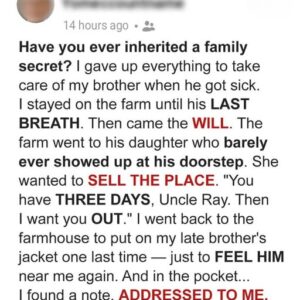I had a nearly 12-hour flight scheduled to depart early in the morning.
Knowing how long and uncomfortable it could be, I made sure to book a seat with extra legroom ahead of time.
But when I boarded the plane, I was surprised to find a 12-year-old boy sitting in my seat, casually browsing his phone. His mother sat beside him.
Thinking it might be a mix-up, I politely asked if they were in the right seats. But no—they were. My assigned seat was the one the boy was occupying.
His mother quickly jumped in and asked me to switch seats. She gestured toward the boy and said, “He gets anxious in tight spaces. Would you mind sitting in my seat instead? It’s just a few rows back.”
She said it like it was nothing. Like it wouldn’t affect me in the slightest. But when I glanced at the seat she was offering—it was a standard middle seat, cramped between two strangers, with no extra legroom.
I smiled politely and replied, “I’m really sorry, but I specifically booked and paid extra for this seat.”
Her face fell. “He’s just a child.”
I nodded, calmly. “I understand that. But I also prepared for this. I have a bad knee, and it’s a long flight.”
She sighed—loudly enough for people around us to hear. “Some people just don’t care.”
That stung. I wasn’t trying to be unkind. But I had my reasons. Sitting in a tight seat for 12 hours would leave me limping for days. I offered to call a flight attendant to help, but she waved me off dramatically and muttered something about selfish people.
Eventually, clearly annoyed, she told her son to move so I could take my seat.
I felt like the villain of the flight. Even as others boarded, I could feel her eyes burning into the back of my head.
After takeoff, I tried to let it go. I watched a movie, ate the standard meal, and dozed off a bit.
But about two hours in, I noticed a bit of a commotion a few rows behind me. Someone was asking for assistance—saying their son wasn’t feeling well.
I turned around. It was her. The same mother. Her son looked pale, sweaty, and clearly distressed.
A flight attendant rushed over with water and began asking if he had any medical conditions.
The mom explained that he sometimes experienced mild panic attacks in closed spaces, though it had never happened on a plane before.
My stomach turned. I didn’t want this to happen to anyone, especially not a kid.
A man sitting across the aisle offered to swap seats, giving the boy a bit more space. Eventually, he began to settle.
I leaned back, but the guilt gnawed at me.
Was that my fault?
Or had she already known this might happen—and hoped that guilt would convince someone else to give up their seat?
I didn’t want to judge. But something didn’t feel right.
When we landed, people stood to stretch and grab their bags. I caught her glancing my way again—but this time, her expression had softened.
We ended up in the same line at customs. She hesitated, then stepped closer.
“I just wanted to say… I’m sorry for earlier,” she said. “I was overwhelmed. I didn’t handle it well.”
I was caught off guard.
“It’s okay,” I replied. “Flying with kids is no joke. I’m glad he’s alright.”
She offered a tired smile. “He’ll be fine. We don’t usually travel. This was… a special case.”
She didn’t explain further, and I didn’t press.
I thought that would be the end of it.
But two days later, I got a message on Facebook from someone named Roselyn Isley.
It was her.
She’d somehow found me through a mutual friend tagged in a trip photo.
Her message was brief:
“Thank you for not giving up your seat. I know that sounds strange. But if you had, it would’ve just encouraged me to keep manipulating situations like that. I’ve done it before. It started with small things—restaurant lines, theme parks—but it’s been escalating. I needed a wake-up call. You gave me that. I hope your trip was restful.”
I sat there rereading it, unsure how to respond. She wasn’t asking for praise—or even forgiveness. Just being honest.
Eventually, I replied:
“I’m glad your son is okay. We’ve all bent the truth before. What matters is recognizing it. Thanks for reaching out.”
I figured that would be the last I heard from her.
But a few weeks later, she messaged again—this time with a longer explanation.
She told me they’d been flying to visit her son’s father—her ex-husband—who had been in a serious accident. The two of them weren’t on good terms, and her son barely knew the man. The trip had been emotionally loaded, and the stress had gotten to her.
She admitted she didn’t handle things well. Instead of contacting the airline or asking to board early, she defaulted to guilt—because it had worked in the past.
“I saw you alone, no kids, and assumed you wouldn’t put up a fight. But I didn’t consider your reasons for picking that seat.”
Her honesty struck me. It takes courage to admit something like that.
We began to exchange occasional messages—nothing deep, just friendly chats.
I learned she worked part-time at a community center and was finishing a degree online. Her son’s name was Kieran. He loved astronomy and hated broccoli.
I told her I worked in IT, loved hiking, and had a bad habit of buying books I never read.
It wasn’t flirtatious—just a respectful, unexpected connection that came from conflict.
Months passed.
Then one day, she messaged:
“You won’t believe this, but Kieran still talks about you. He calls you ‘the guy who made Mom think twice.’ He’s joking—but it stuck.”
I laughed.
“Glad I could be a life lesson.”
She replied:
“No joke—he told a teacher recently that manipulating people isn’t worth it. That it always comes back around.”
That hit harder than I expected.
I thought back to that flight. The tension. The awkward silence. The uncomfortable glances. And how, somehow, it became a turning point.
It reminded me that boundaries matter. And that standing firm—without being cruel—can do more good than we realize.
A year later, I was in her city for a work conference.
We met up for coffee.
She brought Kieran.
He was older now, taller. He said he remembered me and thought I looked like “some businessman with zero patience.”
I laughed. “Sounds about right.”
Then he added, “But Mom says you did the right thing. So… thanks for making her think about stuff.”
That coffee turned into lunch. Then dinner a few nights later.
It never became romantic. That wasn’t the point.
But we stayed in touch. Every few months, she sends me a random photo—Kieran with his telescope, baking cookies, holding up a school certificate.
It’s a small thing. But it matters.
And to this day, I still think about that flight.
Because sometimes, doing what’s fair doesn’t feel kind in the moment. But kindness without honesty can easily become manipulation—even if it’s unintentional.
Roselyn taught me that it’s okay to mess up, as long as you own it.
And Kieran reminded me that kids are always watching—soaking in everything.
So the next time someone tries to guilt you into giving up something that matters to you, remember:
You can have compassion without giving up your boundaries.
You can say no and still be kind.
You can stand your ground—and still plant a seed.
If this story made you pause, smile, or think a little deeper—give it a like and share it with someone who could use the reminder:
Small actions ripple further than we realize.





